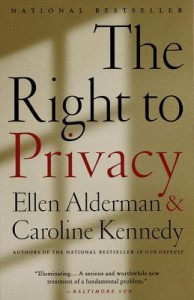 Despite the word “privacy” not appearing anywhere in the US Constitution, this country’s citizens believe fervently in its importance. But as Ellen Alderman and Caroline Kennedy’s 1997 book shows, the concept of being “left alone” is under siege.
Despite the word “privacy” not appearing anywhere in the US Constitution, this country’s citizens believe fervently in its importance. But as Ellen Alderman and Caroline Kennedy’s 1997 book shows, the concept of being “left alone” is under siege.
The Right to Privacy is the result of Alderman and and Kennedy’s survey of dozens of court cases debating the legality of everything from strip-searches for minor traffic violations to abortion to whether or not bosses can monitor their employee’s off-the-clock lifestyles and fire them for behavior they consider inappropriate.
We may consider privacy one of our inalienable rights, but it turns out the government may not always agree.
A timely read
I’m a rabid hater of anything that smacks of invasion of privacy or censorship — I’ve always been a private person, and like many of my fellow Bookworms I consider censorship one of the world’s worst evils.
While I don’t consider it necessary to wear a tinfoil hat to keep the government from accessing my thoughts, this year’s revelations about the extent of the NSA’s surveillance programs certainly has me nervous. Add to this the fact that as a marketer I know about the tools companies use to track their customers across the Internet, and you’ve got a recipe for a bit of a Nervous Nelly.
This issue isn’t going away — in fact, it’s becoming even bigger and more personal. The Right to Privacy was written in 1997, almost a decade before the rise of the now-ubiquitous Twitter, Facebook, and so forth.
And if the government was contradictory and unsure then, I’m wondering how crazy it’s gotten since.
Liberty vs. safety
Although the cases discussed in the book are varied, they all seem to fall under the theme of trying to balance individuals’ right to privacy with “the greater good” — the life of a fetus, for example, or the good of a company, or the sharing of “newsworthy” information that benefits others.
The Right to Privacy was a fascinating read, but in the end didn’t provide any solid answers to the questions brought up by the authors. And it also put me in mind of one of my favorite Benjamin Franklin quotes:
They who can give up essential liberty to obtain a little temporary safety deserve neither liberty nor safety.
What do you think about the privacy issue? Are you careful about what you reveal on social media?







The privacy issue is difficult indeed. I think I’m in the camp of “if you don’t want others to know about it, don’t tell anyone.” And yes, I’m careful about what I put on social media. Well, that’s not exactly accurate. For the most part I don’t care who knows about me, I’m not a private person at all. 🙂
Franklin’s quote does cause me to stop and think, simply because I believe he was a genius. Yet, I want to believe that our government’s efforts are meant to avoid another 9/11 episode, and are a large and more permanent kind of safety. Also, I care very deeply about the rights of everyone – public people like me, and private people like you.
All in all, we should tread lightly, and make decisions with great care.
Agreed, Susan — I definitely don’t share things I want to keep secret, especially on the Internet. But then I think about how Facebook new a guy was gay even though he hadn’t told anyone, and that’s a whole new level of scary — outed by technology.
You’re right that the key is treading lightly and balancing freedom with protection, but I don’t think we (or the government) really know how to strike that balance — privacy is still a gray area, and getting grayer all the time. I just hope we can all move in a direction that is best for everyone.